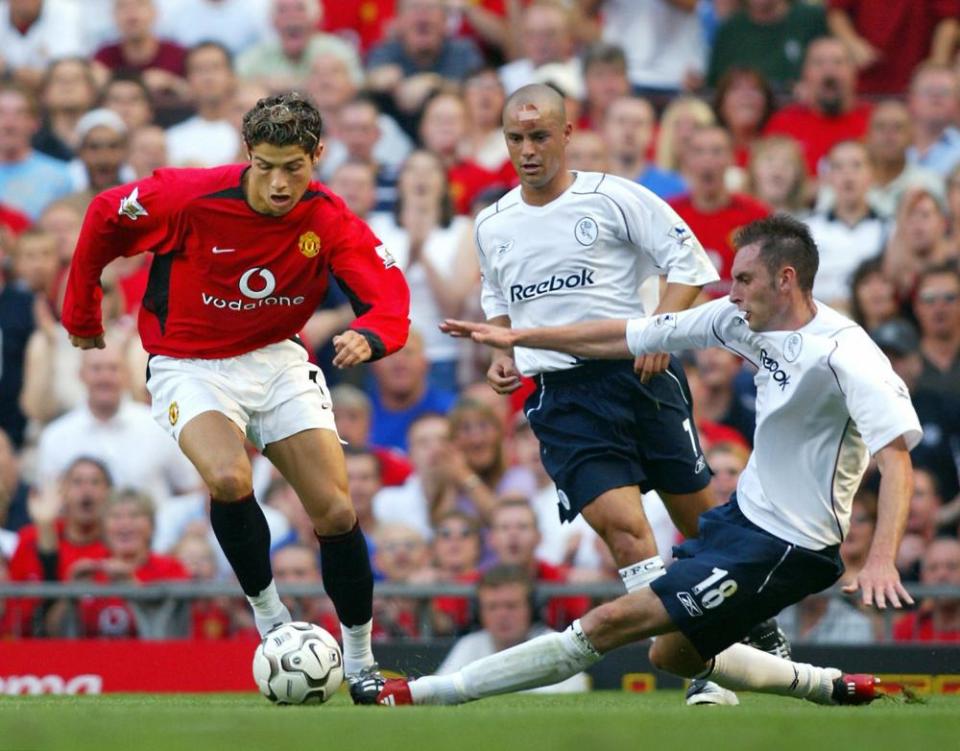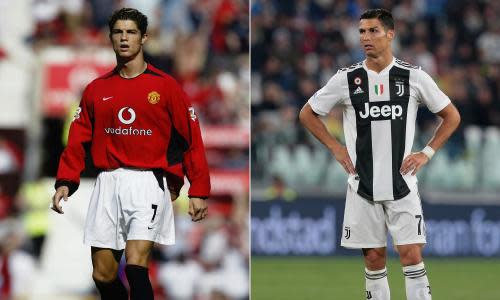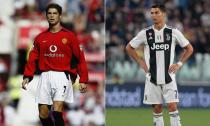Skill, desire and Sir Alex: how Ronaldo transformed Manchester United
Mike Phelan observed all of Cristiano Ronaldo’s six years at Manchester United from the intimate position of first coach and then number two to Sir Alex Ferguson. So when he says the Portuguese – who returns to Old Trafford on Tuesday with Juventus in the Champions League – took the storied club to a different level, it is a measure of the respect he earned at United.
“The impact Cristiano Ronaldo had – he took the players, staff, the football club into a new dimension. He excelled in the development of the team and the club. He was a young impressionable footballer when he came to the club and left a mature adult. And took his game even further on from then. He was inspirational.”
READ MORE: Cristiano Ronaldo nets record 400th league goal
READ MORE: The staggering amount Ronaldo earns for one Instagram post
He had arrived at Old Trafford as an 18-year-old in August 2003. When he joined Real Madrid in 2009, he had won three Premier League titles, one FA Cup and two League Cups – plus Europe’s most glittering prize, the Champions League, claimed a year earlier against Chelsea in Moscow.
Still only 24 when he left, Ronaldo was in Phelan’s view the driving force in United’s most successful era, a period that included the legacy of a third European Cup final in four seasons (in 2011) and the Premier League title the same season.
Ronaldo’s rise also underlined how every great player must realise their potential through hard work and an unerring focus on improvement. “His demands were great – he wanted to be the world’s best,” says Phelan, who now works in Australia as sporting director for the A-League club Central Coast Mariners and is chairman of the equipment supplier sensiblesoccer.co.uk. “He understood that being at United gave him the profile he needed, the theatre to perform and to produce the football we all knew he could. He trained hard, played hard. His desire was as good as anything I’ve come across.”
‘The first time I saw Ronaldo he was terrorising us from every angle. Players were saying: “What did we just witness?”’
Quinton Fortune
Ronaldo’s sublime talent was first evident when Ferguson’s side lost 3-1 to Sporting Lisbon in a friendly on 7 August 2003. Five days later he became United’s first Portuguese signing, for £12.8m. Quinton Fortune was in the team beaten at the Estádio José Alvalade. “The first time I saw Ronaldo he was terrorising us from every angle – and you’re thinking: ‘Don’t come my side,’” says Fortune. “Afterwards in the changing room players were saying: ‘What did we just witness?’ He was absolutely amazing.”
Fortune was also in the United XI when Ronaldo made his debut, replacing Nicky Butt for a scintillating last half-hour in a 4-0 win over Bolton four days after his move. United were only 1-0 ahead when Ronaldo entered and his impact had George Best describing it as “the best debut I’ve ever seen”. “I remember watching the boss’s reaction after the game,” says Fortune. “He was smiling, as if to say: ‘What is this we just witnessed?’”

Ferguson was to play a key role in Ronaldo’s progress. “Sir Alex nurtured him,” Fortune says. “He couldn’t have asked for a better foundation and support. And together, oh my goodness, those two would rule the world. It was a perfect combination.”
Being the globe’s dominant footballer was in Ronaldo’s mind from day one. “Ronaldo came with so much confidence, it was unbelievable,” Fortune says. “He walked in the changing room and basically told everyone he’s the best. Not in perfect English but you could make it out.
“That set him above all the young players and he could back it up with his work ethic and ability. Even at that age he wanted to be better at everything. If you did something in training he’d practise and come back and do it.”
Fortune believes senior players such as Roy Keane, Gary Neville, Ryan Giggs and Paul Scholes had no issue with this cockiness. “Cristiano might have been walking around saying he’s the best – yes, he was cocky – that was just Ronaldo. And once a young, or any, player backs it up in the game, there isn’t a question mark.”
Ronaldo ended his first season at United by scoring in the 3-0 FA Cup final victory against Millwall, one of six goals in 45 appearances. From here the numbers climbed, until his final season. In 2004-05 he scored nine goals in 50 appearances, then 12 in 47 games and 23 in 53. In Ronaldo’s penultimate term he scored 42 times in 48 games, won a third championship, the European Cup and the first of five Ballons d’Or. His final season ended with 26 goals from 53 appearances, still formidable numbers considering the distraction of his imminent move to Real.
Having arrived as a rangy 6ft 2in winger Ronaldo left as a powerhouse forward. Phelan says: “He learned about levels of fitness, recovery programmes and that the demands were huge – he was playing every three days and for a youngster you’ve got to get your mentality right – he grasped that quickly. That was one of his strengths – learning quick.”
Ronaldo was also brave when opponents targeted him. “Certainly coming to the Premier League, the mental and physical aspects, you’ve got to be in it to understand it,” Phelan says, drawing a contrast with what would have happened if he had stayed in Portugal. “He probably had courage in him but had to use it a lot earlier. He also knew what was good for him and what wasn’t. He was a constantly evolving young man. The great players are great players because they put work in.”

 Yahoo Sport
Yahoo Sport 













































